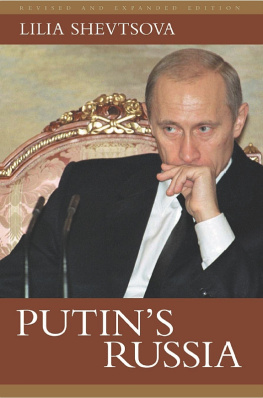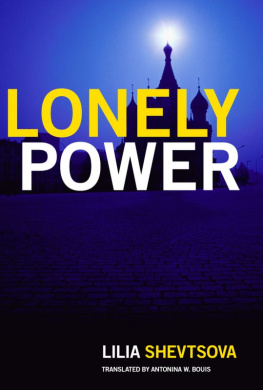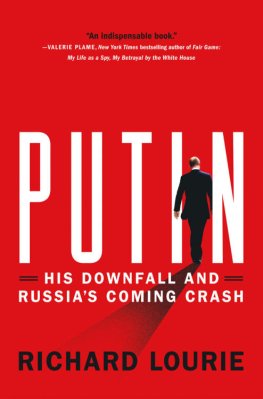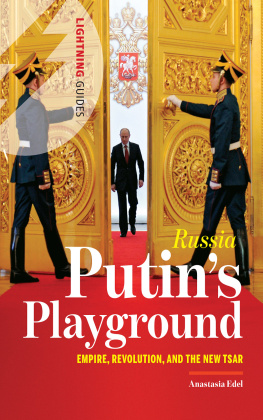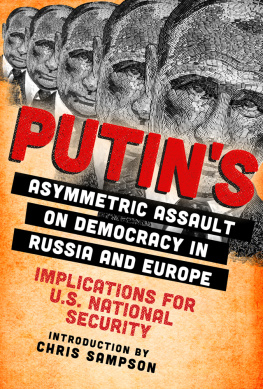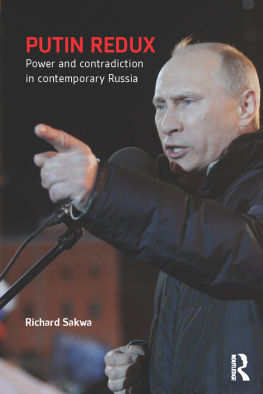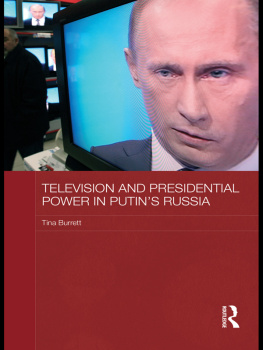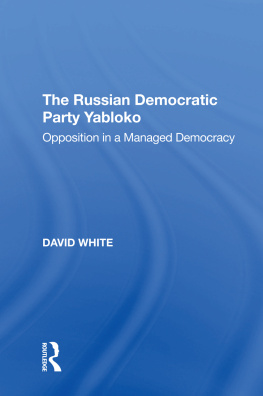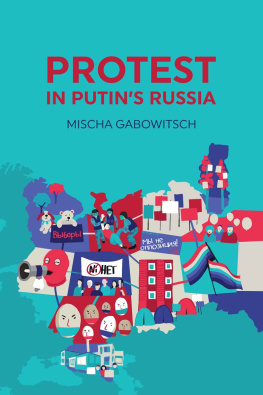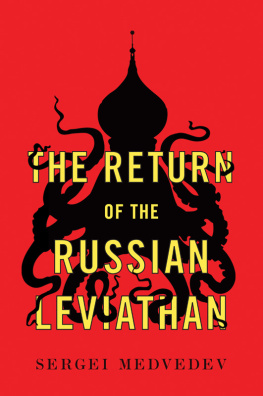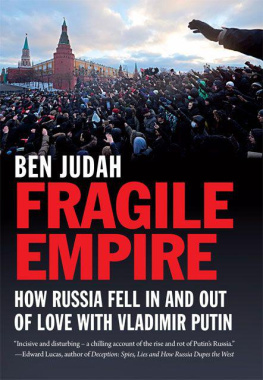PRAISE FOR THE FIRST EDITION OF PUTINS RUSSIA
Lilia Shevtsova is in a class by herself as an analyst and explicator of Russian politics, and her mastery is fully on display in Putins Russia. She combines investigative skills with hard-headed judgment and narrative verve. Her portraits of the main actors are textured and convincing. Not only is this a superb book by a powerful author, it has an additional significance in the context of Russias evolution as a normal modern country: As recently as 15 years ago, this sort of gimlet-eyed look at what goes on in and around the Kremlin was available only from dissidents, emigrants and Western specialists. Its a testament to how far Russia has come from Soviet timesand it augurs well for Russias futurethat someone of Shevtsovas intellectual integrity, independent convictions, and relentless honesty, based at a Moscow think tank, can help all of us understand whats happeningand whyin the leadership of her country.
STROBE TALBOTT, president, Brookings Institution
Winston Churchill said that Russia is a mystery inside an enigma. Having been in Russian politics for the past twelve years, I can attest that Lilia Shevtsova in her latest book has brilliantly succeeded in unwrapping the Russian enigma. As for the mystery, it will finally be solved only by history.
GRIGORY YAVLINSKY, head of Russias Yabloko party
OTHER BOOKS BY LILIA SHEVTSOVA
GORBACHEV, YELTSIN, AND PUTIN: Political Leadership in Russias Transition (edited with Archie Brown)
YELTSINS RUSSIA: Myths and Reality
To read excerpts and find more information on these and other publications from the Carnegie Endowment, visitwww.CarnegieEndowment.org/pubs

2003, 2005 Carnegie Endowment for International Peace. All rights reserved.
No part of this publication may be reproduced or transmitted in any form or by any means without permission in writing from the Carnegie Endowment.
Carnegie Endowment for International Peace
1779 Massachusetts Avenue, N. W., Washington, D. C. 20036
202-483-7600, Fax 202-483-1840
www.CarnegieEndowment.org
The Carnegie Endowment for International Peace normally does not take institutional positions on public policy issues; the views and recommendations presented in this publication do not necessarily represent the views of the Carnegie Endowment, its officers, staff, or trustees.
To order, contact Carnegies distributor:
The Brookings Institution Press
Department 029, Washington, D. C. 20042-0029, USA 1-800-275-1447 or 1-202-797-6258
Fax 202-797-2960, Email
Cover photo: Russian president Vladimir Putin at the Kremlin during the three-day hostage siege at a Moscow theater in October 2002 (AP/Wide World Photos).
Library of Congress Cataloging-in-Publication Data
Shevtsova, Lilia Fedorovna.
Putins Russia / Lilia Shevtsova; translated by Antonina W. Bouis.Rev. and expanded ed.
p. cm.
Includes bibliographical references and index. ISBN 0-87003-213-5 (pbk.: acid-free paper); ISBN 978-0-87003-293-6 (e-book)
1. Russia (Federation)Politics and government19912. Putin, Vladimir Vladimirovich, 1952I. Title.
DK510.763. S492 2005
947.086092dc22 2004029072
CONTENTS
Yeltsin on the wane. The Primakov formula. Who runs Russia? The Kremlin seeks an heir. The Bank of New York scandal. Enter Putin. Russia wants order. The uses of war.
The parliamentary elections of 1999. The difficult fate of Russian liberals. The Communist Party as a still powerful element. Yeltsin amazes everyone and departs. What Yeltsin leaves to his heir.
Presidential elections without a choice. What course to take? The new Kremlin spider web. Formation of the government. Taming of the governors. Whom to rely upon. The intelligentsia is concerned.
Putin repeals the taboo on persecution of the oligarchs. The victor in the boring wilderness. A harsh August and a feeling of suffocation. Reinforcing the superpresidential regime. Military reform.
Chechnya as a trap. The government under the gun. The Soviet anthem. Putin enters the world. Why does the president want power?
Back to the kitchen. Society seeks calm. Russian Gaullism. Who loves Russia more? Pogrom at NTV. Wax dummies.
Putin renews market reforms. Fighting bulldogs under the carpet. Moscow and Washington work it out. The Russian president chooses the West. Disturbing signs.
The nature of stability. The grudges continue. New address to the nation as the reflection of the Kremlins disorientation. Putin moves to the West, leaving the elites behind. Yeltsin is dissatisfied with his heir. New uncertainties. Chechnya again reminds Moscow about itself. The traditional Russian choice: Freedom or order?
Putin considers his course. Why does Russia choose old Europe and disappoint America? The Kremlins anti-oligarch revolution. The December Duma electionscertain results in uncertain circumstances. The optimism of youth.
How to win an election by ignoring it. Firing the unsinkable Kasyanov. The liberals are paralyzed. Putin gets his new legitimacy, which again looks vulnerable. Moscow ponders its relations with the West. Russia and the European Union: dating without hope of marriage.
Putinism as a continuation and rejection of Yeltsinism. The economics of growth without development. The social sphere: Degradation continues. Russia and the West in search of selective partnership. Did the president have an alternative? The dangers of oversimplification. An evaluation of political leadership.
Russia wants democracy. The social Darwinism of power. Khodorkovsky repents. Liberalism versus neoconservatism. Chechnya: the ritual murder of Kadyrov. Are there parties left in Russia? Putins economic challenge. The banking crisis. Russian foreign policy: trial by new realism. The Beslan tragedy and its aftermath.
The Westmeans and goal. The Faustian bargain. Will Russia be able to reject the Russian System? Russias hope.
R ussia continues to matter. Major world challengesthe war on international terrorism; confronting Islamic fundamentalism; preserving European and world security; stabilizing volatile energy markets; fighting the proliferation of weapons of mass destruction; and dealing with regional conflicts, including the Middle Eastern quagmirecannot be met without Russias constructive participation. To secure Russias integration into the international community is becoming one of the most ambitious challenges for the West in the twenty-first century.
It is true that Russian leader Vladimir Putin has made a pro-Western shift since the terrorist attacks of September 11, 2001. Russia became a U.S. ally in the antiterrorist campaign without asking for any reciprocity and without the usual horse trading Soviet leaders demanded for any concession to the West. There are times when history makes leaders. In the fall of 2001, the attacks transformed a hitherto cautious and tentative politician into a leader who surprised the world by proposing a new role for Russia, one almost unprecedented in history: unconditional support for the West.
Yet, as events after 1945 remind us, a wartime alliance will only survive the end of war if it embodies shared interests and values. Are both the West and Russia prepared to grow from their current anti-terrorist alliance into a constructive strategic partnership, including Russias full-fledged integration into the West? The answer depends first of all on domestic developments in Putins Russia, on how soon Russian elites and Russian society embrace liberal democratic rules of the game.

